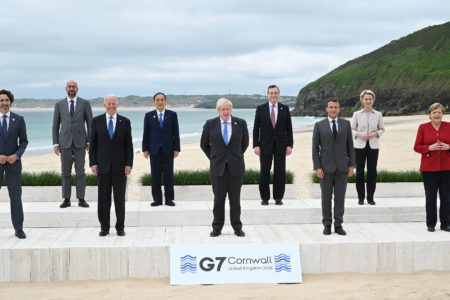
There is much gloom and even a hint of doom in the world today in the wake of last month’s disastrous G7 summit in Italy. Chancellor Angela Merkel’s comments to supporters on her return to Germany made explicit what had been implicitly clear to all, through media reporting and painfully conspicuous body language: we have come to a parting of the ways in the transatlantic partnership, the cornerstone of liberal democratic stability in the world for the better part of a century. Europe can no longer rely on American support for its security and prosperity and must now seek alternatives.
As remarkable as Merkel’s comments were in their repudiation of American leadership in the world, they were striking for another, less remarked-upon fact as well: the quiet relief with which they were greeted. In signalling Germany’s desire to work with its European allies to ensure their own security and prosperity, Merkel also implicitly signalled an intent to play a more active role in managing regional and even global affairs in cooperation with like-minded allies. Simply put, most Western leaders welcome the idea of Germany assuming more of a leadership role in global affairs. We’ve come a long, long way since 1945.
Why is this? For more than 70 years, the United States has been the essential actor in facilitating international cooperation in the face of the world’s security and economic challenges. It didn’t always provide the outcomes that everyone liked, but without its involvement, cooperation was rarely possible at all.
Now, erstwhile American allies face both a short-term problem and some long-term ones. The short-term problem is uncertainty as to what the US will do under President Donald Trump’s administration. The range of outcomes is wide, and the possibility of mid-course changes high. Indeed, German officials are now discussing what to do in the event the US becomes not simply an unreliable ally but an actual threat to German and European interests. Trump’s extremely blunt talk on trade — saying the Germans were “very bad” — does nothing to assuage such concerns.
Given that uncertainty, allies in Europe and elsewhere are looking to reduce dependence upon a Trump-led America for leadership in vital areas such as security, where feasible. This is what Merkel meant when she said, “We Europeans must really take our fate into our own hands.”
As difficult as the present situation is, the long-term problems are in some ways more insidious. Things will not simply go back to the way they were once Trump leaves the world stage. States must price in a wider range of outcomes for all future US administrations. It’s possible that a Trump presidency is an aberration, but it’s also possible that someone equally mercurial will be elected president in the near future.
In the short term, Americans will find it hard to advance any sort of sustained policy initiative internationally.
The costs to the US are likewise both short-term and long-term. In the short term, Americans will find it hard to advance any sort of sustained policy initiative internationally. They will be able to do business with states looking for quick quid pro quos of the type the President prefers, but the US with Trump at the helm seems no longer interested in, and perhaps not capable of, the long hard work of building and managing institutions and relationships — the bedrock of lasting influence in the modern tightly interconnected world.
In the long term, the problems only compound. Part of the tragedy of the situation for the US is how unforced these errors were. There was no structural reason for the US to undergo such a precipitous decline in influence. However one measures it, the US was securely positioned as the undisputed global leader in both hard and soft power. The hard power remains, but the country’s vast reserves of soft power are rapidly being squandered, robbed of the trust that US influence depends on.
Trust is the essential ingredient in international cooperation, and the trust of its allies is precisely what the US has lost. Once lost, trust cannot simply be given back. It must be earned anew. As trust is lost, so too is the influence it provided the US over the policy choices of its allies, as they looked to Americans for support and leadership. Left to their own devices, other countries will choose their own way without consideration of American preferences.
This leads to the one clear silver lining of this whole episode. For all the turmoil described above, the apparatus of global governance endures, as does the central idea of a rules-governed international order. We take for granted how much of our prosperity rests on that edifice, how much we depend on the ability of states to trust one another sufficiently that they can cooperate in the face of anarchy.
Amid all else we learned last month, we saw that the project of international governance endures, even as its original architects turn their backs on it. Germany’s chancellor and like-minded leaders in France, Canada and elsewhere continue to believe in the idea and are willing to work for it. Given the choice, they appear willing to fashion new arrangements in pursuit of the same goals of stability and shared prosperity. The hard work of global governance continues, with or without America’s help.
Photo: Britain’s PM Theresa May, President of the EU Council Donald Tusk, German Chancellor Angela Merkel, Italian PM Paolo Gentiloni, France President Emmanuel Macron, and Canadian PM Justin Trudeau walk to their first meeting after the welcome ceremony of the leaders of the G7 countries summit . AP Photo/Salvatore Cavalli)
Do you have something to say about the article you just read? Be part of the Policy Options discussion, and send in your own submission. Here is a link on how to do it. | Souhaitez-vous réagir à cet article ? Joignez-vous aux débats d’Options politiques et soumettez-nous votre texte en suivant ces directives.






